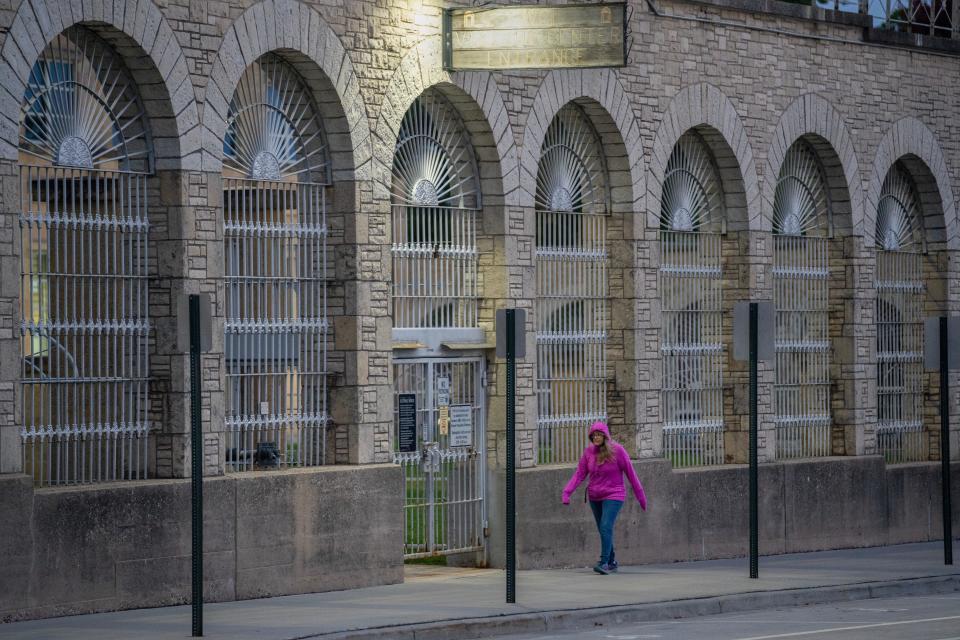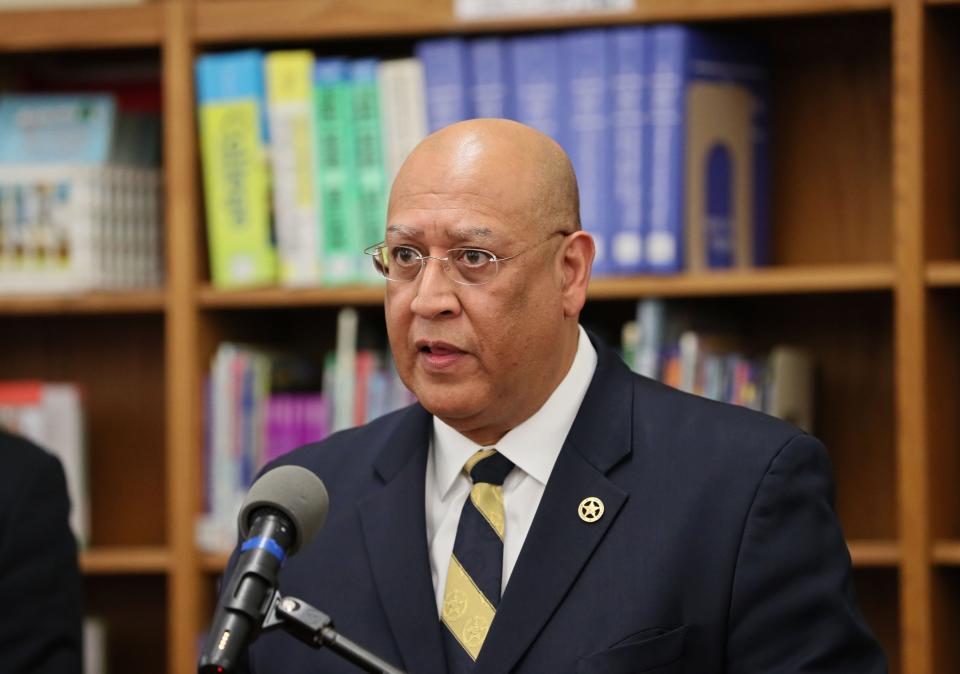After months of outcry, Gov. Tony Evers and DOC move to lift restrictions and increase staff in Wisconsin prisons
- Oops!Something went wrong.Please try again later.
As advocates continue to demand the end of lockdowns at Wisconsin's prisons, Gov. Tony Evers and Department of Corrections Secretary Kevin Carr announced plans Tuesday to begin lifting restrictions at two of the state's oldest prisons, Waupun Correctional Institution and Green Bay Correctional Institution.
The plans include opening access to more services in the prisons, reducing the prisoner population at Waupun, updating solitary confinement policies, and continuing to recruit more staff with the enticement of higher pay.
Due to security concerns in the overcrowded and understaffed facilities, Waupun Correctional Insitution has been on lockdown — or what the Department of Corrections calls "a state of modified movement" — since March. Green Bay Correctional Institution has been under lockdown since June.
Stanley Correctional Institution, while under fewer restrictions than the Waupun and Green Bay prisons — is nearing a year of modified movement.
The Department of Corrections contends that prison officials have been gradually easing restrictions throughout the past few months. But incarcerated people, family members and prison reform advocates say the ongoing lockdown conditions are inhumane, and leave people confined to a small cell, usually with another person, at nearly all hours of the day.
In recent months, the Milwaukee Journal Sentinel and USA TODAY NETWORK-Wisconsin have reported on troubling conditions inside the facilities, including rodent infestations, rampant violence, and lack of access to medical care, as well as several deaths.
Evers' announcement Tuesday comes after the governor accompanied Carr on a visit to Waupun Correctional Institution Thursday and spoke with prison staff and people incarcerated there, according to a news release from the governor's office. He plans to visit other prisons in the coming weeks.
"I appreciated my conversations with correctional staff and people in our care last week and the opportunity to discuss the challenges facing our correctional institutions," Evers said in a statement. "We will continue to use every lever and option available to bolster staffing resources and address vacancy rates to ensure the safety of staff and people in our care while resuming critical programming.”
For Dant'e Cottingham, the interim associate director of Ex-Incarcerated People Organizing, or EXPO, these changes fall short.
"While the governor's statements express a level of concern, there is a discernible gap between mere acknowledgement and a steadfast commitment to address the problem at its core," Cottingham said.
"(Evers' announcement) falls short of demonstrating a genuine commitment to eradicating torture," he added.
Prisoners will have more opportunities to leave cells
Effective Tuesday, only "visitation, personal hygeine frequency, and recreation time" will remain limited at Waupun Correctional, while Green Bay Correctional will only keep restrictions related to visitation and recreation, according to the governor.
Officials say the Waupun prison has gradually lifted some restrictions since April, and has been giving out an average of over 500 "passes" each week that allow prisoners to travel out of their cell to other areas of the prison for attorney visits, health services, psychiatry and psychology appointments and law library visits, the news release says. The prison was housing 1,005 people as of October.
The Department of Corrections states Green Bay Correctional similarly has been allowing some movement in the prison for health services, attorney meetings, chapel services, once-a-week recreation for some prisoners and "cell front educational services."
But multiple prisoners told USA TODAY NETWORK-Wisconsin that over the past few months, they have not been able to leave their cells for meals or recreation, and are limited to one to two showers a week.

Increased pay to reduce staffing shortages
Evers cited the pay increases secured in the most recent bienniel budget as a draw expected to increase staff numbers.
Wisconsin’s GOP lawmakers passed a plan in June to raise pay for state employees, which would also bump up the starting pay for correctional officers to $33 per hour.
At the start of the month, staff vacancy rates at Waupun Correctional Institution and Green Bay Correctional Institution were 54.6% and 40.9%, respectively.
The news release from the governor's office says there are hundreds of beds across several of the state's prisons that are not available due to low staffing.
At the start of the month, Waupun Correctional housed 120 more people than its 882-person capacity, while Green Bay Correctional had 234 people more than the 749 people it was designed for.
The prison system’s total design capacity can accomodate 17,571 prisoners. As of Nov. 10, Wisconsin’s total prison population had surpassed more than 21,830.
No more cellmates at Waupun Correctional Institution
Under Evers' direction, the Department of Corrections also plans to transition Waupun Correctional Institution to all single cells by March 1, the news release states.
The change will require about 220 people currently incarcerated at the Waupun facility to be moved to another prison.
The change aims to reduce security concerns and allow the Waupun prison to further lift lockdown restrictions.
RELATED: Protesters advocate closing Green Bay Correctional Institution, ending lockdown
RELATED: 'It's truly a torture chamber': Advocates protest to highlight lockdown at Waupun prison
Plan includes reducing solitary confinement
Evers and Carr also announced that DOC will update its policies on restrictive housing — also known as solitary confinement or segregation.
The updated policies will limit the use of restrictive housing as punishment for people with a serious mental health diagnosis, and will require correctional staff to make security rounds every 30 minutes in restrictive housing in an effort to ensure quick responses to any prisoners in distress, according to the news release.
DOC will also require a higher level of approval for solitary confinement longer than 120 days.

In September, the Journal Sentinel reported on the death of Dean Hoffmann, a prisoner with a diagnosed mental health disorder who died by suicide while in solitary confinement at Waupun during the lockdown. Two other deaths that occurred at Waupun are currently under investigation.
At Green Bay Correctional, two suicides that occurred between 2019 and 2022 occurred in the facility's restrictive housing unit.
The agency’s use of solitary confinement had been trending upward, with 957 people in solitary confinement as of August, including 122 prisoners with serious mental health illnesses such as bipolar disorder, schizophrenia and severe depression, according to figures from the Department of Corrections.By the end of September, there was a dip in its use, with 923 prisoners placed in solitary confinement.
Aging prisons will be costly to upgrade
Evers acknowledged that Waupun Correctional Institution — which was built in 1851 and is the state's oldest prison — needs costly upgrades that will "likely require razing and replacing existing structures."
A DOC master plan started under former Gov. Scott Walker and completed in 2020 noted that “additional significant upgrades will be necessary in the coming years” to keep Waupun operational, he said.
But with no quick solution to reducing the state's prison population and ongoing staffing shortages, Evers is directing the Department of Corrections to "review and consider potential capital planning options," the news release states.
Evers said that the steps introduced on Thursday would hopefully act as a relief valve for the decade-long staffing pressures across Wisconsin’s prisons, with his office closely monitoring these efforts and how effective they are.
If the efforts are unsuccessful in reducing the agency’s vacancy rate, Evers said he would take the department’s recommendations for capital project options.
Allouez Village President Jim Rafter, who has staunchly advocated for the closure of Green Bay Correctional Institution, said he appreciates the governor's steps but that more needs to be done.
“Anything short of a full closure of GBCI is woefully inadequate," Rafter said in a statement Tuesday. "The facility is a powder keg and we’re hopeful that the Governor’s capital planning exercise will further demonstrate that it's past time to shutter this 125-year-old facility that poses a considerable safety threat to our community."
Contact Kelli Arseneau at 920-213-3721 or karseneau@gannett.com. Follow her on X at @ArseneauKelli. Contact Vanessa Swales at 414-308-5881 or vswales@gannett.com. Follow her on X @Vanessa_Swales.
This article originally appeared on Appleton Post-Crescent: After outcry, Evers moves to lift restrictions in Wisconsin prisons

